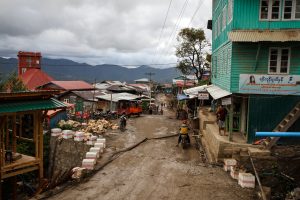It has now been three years since the U.N. Security Council, led by the United Kingdom as the penholder, convened urgent discussions on Myanmar on November 9, 2021, in response to alarming signs of impending mass atrocities. This was triggered by the junta’s dispatch of a large military convoy to Chin State, including infamous military units such as the Light Infantry Division (LID) 77 and LID 99, both notorious for their involvement in the Rohingya genocide.
However, despite the adoption of the first and only Security Council resolution on Myanmar in the U.N.’s history, a binding resolution that demanded an immediate end to violence and respect for human rights, the junta’s campaign of terror has continued unabated, particularly in the once-vibrant town of Thantlang, the place of my birth, which now lies in ruins.
Alerted by the Chin Human Rights Organization, the mass military deployment arrived just as Thantlang town was coming under relentless attack. A population of over 10,000 residents was forcibly displaced, and the town has been leveled by repeated air and ground assaults. Since these initial attacks, Thantlang has been targeted dozens of times, even though its entire population has been forced to flee. What was once a place of peaceful community life is now a ghost town, reduced to ash and rubble.
Over the past three years, Chin State has been subjected to some of the heaviest military assaults seen anywhere in Myanmar. The junta has conducted disproportionate and indiscriminate airstrikes, dropping over 1,200 bombs, many weighing as much as 1,000 pounds, in more than 500 air raids. The human cost of these attacks has been devastating: at least 108 civilians have been killed, including 29 children, and 231 others wounded, including 21 children. The destruction has not only taken lives but obliterated essential infrastructure. Over 470 buildings and houses have been destroyed, including 22 schools, 21 churches, five Buddhist monasteries, and six hospitals. The emotional toll on the people of Chin State, and the broader Chin population, is immeasurable.
As someone who grew up in Thantlang and has spent the last 25 years documenting human rights abuses as the leader of the Chin Human Rights Organization, I have personally witnessed the immense destruction inflicted upon my hometown and my people. I have been involved in documenting these atrocities and in the filing of a criminal complaint against members of the Myanmar junta under universal jurisdiction in the Philippines. The military’s use of airstrikes has been the single most devastating weapon in their campaign of terror, bringing untold destruction to civilian populations across the country.
The junta’s ability to wage such an aggressive air war has been facilitated by the continued supply of aviation fuel. Without access to this critical resource, the military’s air power would be severely hampered. Therefore, to limit the scale of destruction and prevent further atrocities, targeted and comprehensive sanctions on the sale and supply of aviation fuel are urgently needed. The international community has begun to take steps in the right direction: we welcome the coordinated sanctions imposed by the U.K., United States, and Canada against aviation fuel companies and the businessmen enabling the junta’s war machine. These sanctions are an important first step toward cutting off the military’s access to the fuel they need to carry out their airstrikes.
However, sanctions on aviation fuel alone are not enough. The international community must expand its sanctions to target individual military commanders and civilian leaders responsible for orchestrating and enabling these international crimes. Expanding sanctions would send a powerful message to the victims and survivors of the junta’s atrocities, that although the wheels of international justice may turn slowly, the world is not indifferent to their suffering. By targeting the leaders who bear command and control responsibility, the international community will also fulfill its commitment to holding the junta accountable for its atrocity crimes.
The human and emotional toll of this conflict has been too great for us to bear. We are exhausted from counting bodies, the endless casualties, and the widespread destruction brought by the junta’s relentless assault on Myanmar. The people of Chin State and Myanmar as a whole have suffered enough. It is not enough to simply express outrage or sympathy from afar. Now is the time for decisive action to constrain the junta’s war machine and stand with the people of Myanmar in their fight for justice and freedom.
Our resilience will continue, but we cannot do it alone. We need the world to stand with us, now more than ever.

































